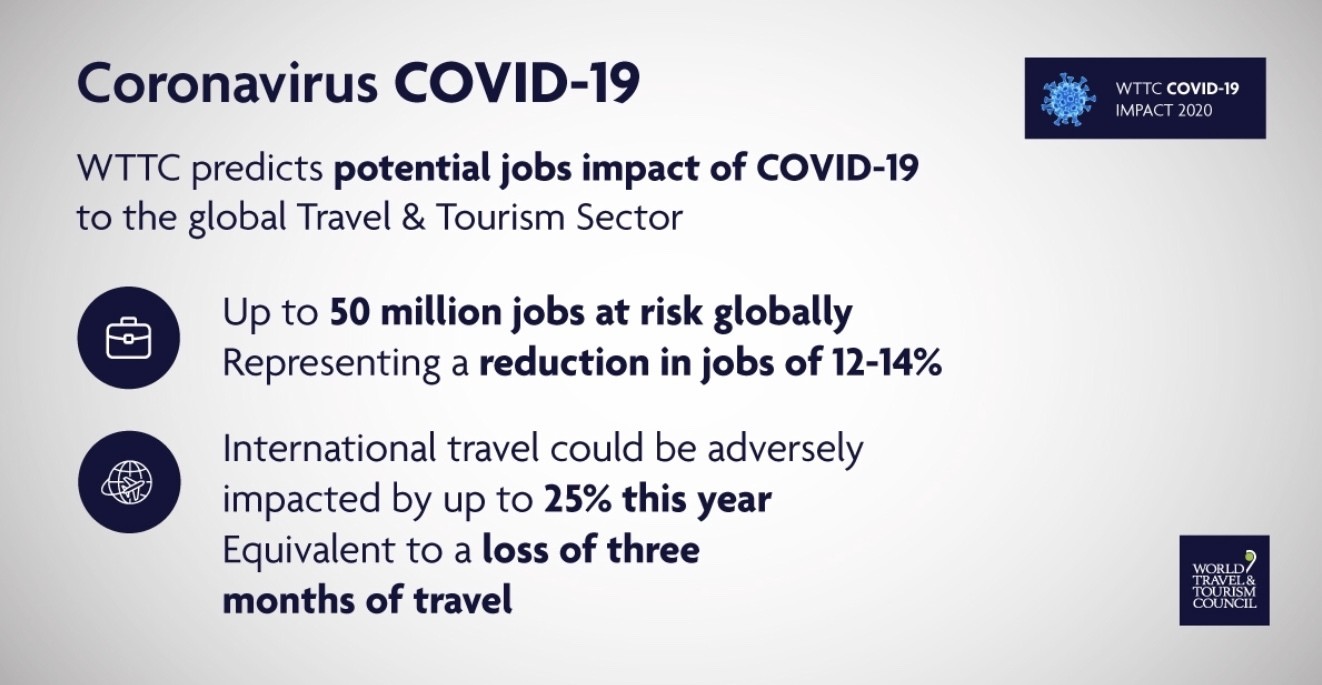This is how coronavirus could affect the travel and tourism industry

Airlines and cruise ships are currently more affected than hotels. Image: via REUTERS

Explore and monitor how COVID-19 is affecting economies, industries and global issues

Get involved with our crowdsourced digital platform to deliver impact at scale
Stay up to date:
COVID-19
- The World Travel and Tourism Council has warned the COVID-19 pandemic could cut 50 million jobs worldwide in the travel and tourism industry.
- Asia is expected to be the worst affected.
- Once the outbreak is over, it could take up to 10 months for the industry to recover.
- The tourism industry currently accounts for 10% of global GDP.
The coronavirus epidemic is putting up to 50 million jobs in the global travel and tourism sector at risk, with travel likely to slump by a quarter this year, Asia being the most affected continent, the World Travel and Tourism Council has said.
This impact would depend on how long the epidemic lasts and could still be exacerbated by recent restrictive measures, such as those taken by the U.S. administration on travel to Europe, WTTC’s managing director Virginia Messina told Reuters.
“Certain measures are not helping and they can prompt the economic impact to be way more significant,” Messina said referring to the U.S. decision.
She argued that such policies are too generic and not proven to be effective to contain the virus. She also said that such restrictions could complicate travel by medical experts and delivery of medical supplies.

Around 850,000 people travel each month from Europe to the United States, equivalent to a $3.4 billion monthly contribution to the U.S. economy, Messina said.
Of the 50 million jobs that could be lost, around 30 million would be in Asia, seven million in Europe, five million in the Americas and the rest in other continents, she projected.

The equivalent to a loss of three months of global travel in 2020 could lead to a corresponding reduction in jobs of between 12% and 14%, the WTTC said, also calling on governments to remove or simplify visas wherever possible, cut travel taxes and introduce incentives once the epidemic is under control.
She also encouraged flexibility in the sector, so that travelers can postpone and not cancel their plans.

By sector, airlines and cruise ships were currently being more impacted than hotels, the official added.
The tourism industry accounts for 10% of the world’s GDP and jobs.
The WTTC official defended the confinement of certain towns - as is currently happening in Italy and Spain - if health officials recommend it to contain the outbreak, but only in specifically targeted areas or for certain age groups.
Messina estimated that, once the outbreak is under control, it would take up to 10 months for the tourism sector to return to its normal levels.
Don't miss any update on this topic
Create a free account and access your personalized content collection with our latest publications and analyses.
License and Republishing
World Economic Forum articles may be republished in accordance with the Creative Commons Attribution-NonCommercial-NoDerivatives 4.0 International Public License, and in accordance with our Terms of Use.
The views expressed in this article are those of the author alone and not the World Economic Forum.
Related topics:
The Agenda Weekly
A weekly update of the most important issues driving the global agenda
You can unsubscribe at any time using the link in our emails. For more details, review our privacy policy.
More on Health and Healthcare SystemsSee all
Katherine Klemperer and Anthony McDonnell
April 25, 2024
Vincenzo Ventricelli
April 25, 2024
Shyam Bishen
April 24, 2024
Shyam Bishen and Annika Green
April 22, 2024
Johnny Wood
April 17, 2024





